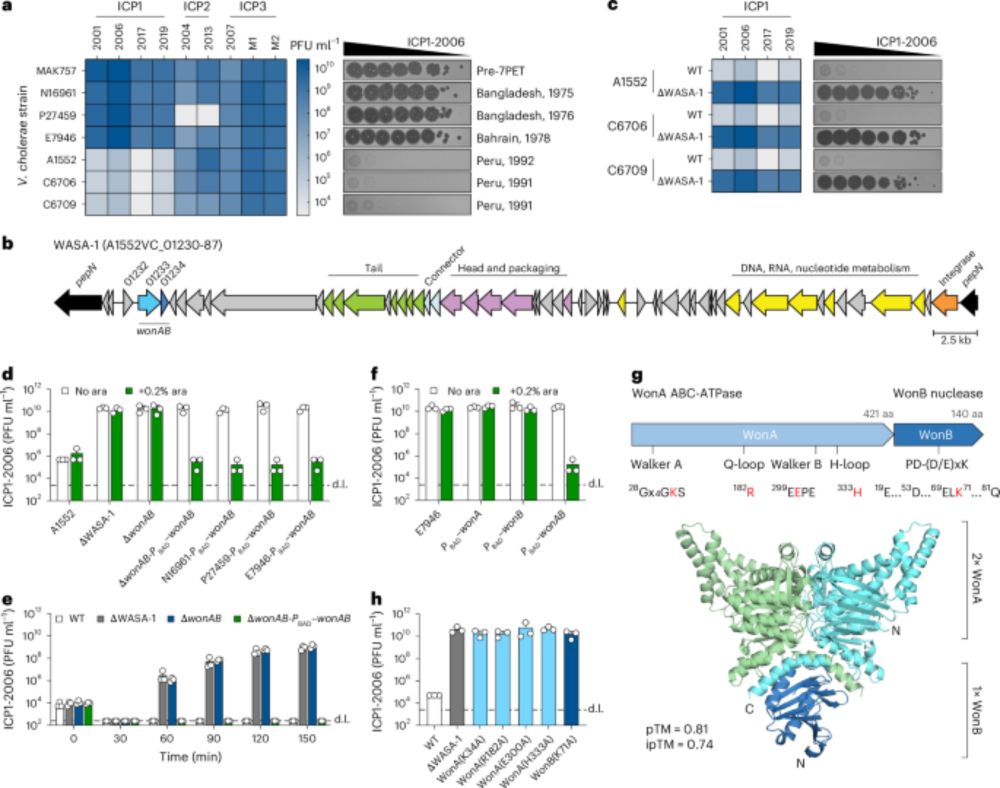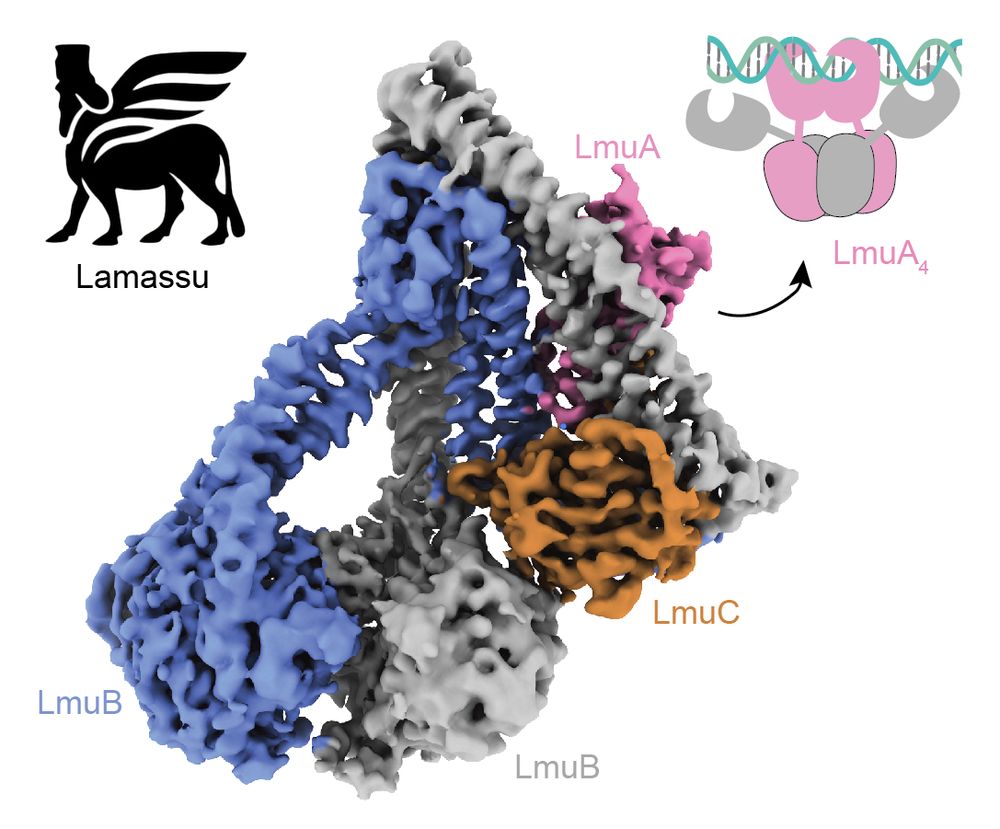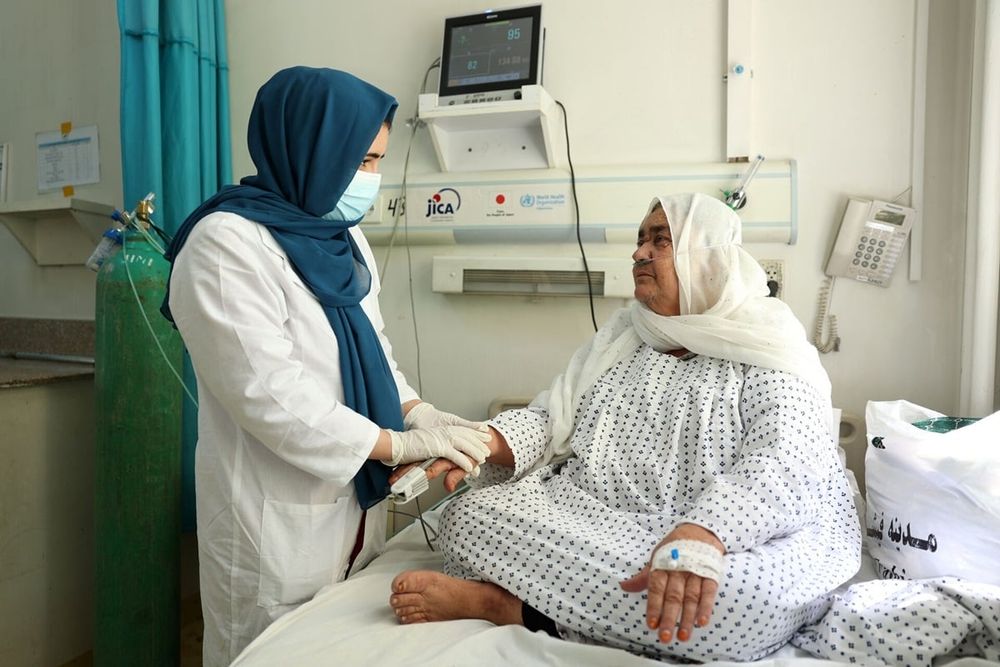
We show that a sub-lineage of 7th pandemic V. cholerae has acquired mobile genetic elements packed with phage defense systems—rendering it multi-phage resistant 😳 ..... 1/3
www.nature.com/articles/s41...

I am very excited to finally share what has been the main focus of my PhD for the past almost 3 years! It is about viral dark matter and a powerful tool we built to shed light on it. 🧬💡
Continue reading (🧵)

I am very excited to finally share what has been the main focus of my PhD for the past almost 3 years! It is about viral dark matter and a powerful tool we built to shed light on it. 🧬💡
Continue reading (🧵)
Our HIDEN-SEQ links the "dark matter" genes of your favorite phage to any selectable phenotype, guiding the path from fun observations to molecular mechanisms.
A thread 1/8

Our HIDEN-SEQ links the "dark matter" genes of your favorite phage to any selectable phenotype, guiding the path from fun observations to molecular mechanisms.
A thread 1/8
Sneak peak on invited speakers and preliminary program:
meetings.embo.org/event/26-bac...

Sneak peak on invited speakers and preliminary program:
meetings.embo.org/event/26-bac...
DAP resistance in enterococci pops up quickly. What’s been missing is why resistance-associated membrane changes look the way they do, and why the classic path of mutations is so predictable.
DAP resistance in enterococci pops up quickly. What’s been missing is why resistance-associated membrane changes look the way they do, and why the classic path of mutations is so predictable.
Thanks to FRM @frm-officiel.bsky.social and CNRS @cnrsbiologie.bsky.social
academic.oup.com/nar/article-...

Thanks to FRM @frm-officiel.bsky.social and CNRS @cnrsbiologie.bsky.social
academic.oup.com/nar/article-...
a 🧵 1/n
Drain: arxiv.org/abs/2511.04820
Strain: direct.mit.edu/qss/article/...
Oligopoly: direct.mit.edu/qss/article/...




a 🧵 1/n
Drain: arxiv.org/abs/2511.04820
Strain: direct.mit.edu/qss/article/...
Oligopoly: direct.mit.edu/qss/article/...
It’s indeed hard & some non-native English speakers know that they can never express themselves as well / effortless in their 2nd & 3rd language as in their mother tongue.
What helps nowadays is ChatGPT and we would appreciate native speakers not bitching about us using it 🫣
It’s indeed hard & some non-native English speakers know that they can never express themselves as well / effortless in their 2nd & 3rd language as in their mother tongue.
What helps nowadays is ChatGPT and we would appreciate native speakers not bitching about us using it 🫣
Yesterday I gave a 1-hour research seminar in French. Afterwards, my brain was pretty much done for the day.
Respect to the loads of scientists who do this daily (and usually a lot more effectively than me!)
Yesterday I gave a 1-hour research seminar in French. Afterwards, my brain was pretty much done for the day.
Respect to the loads of scientists who do this daily (and usually a lot more effectively than me!)
Learn more in the profile of Tobias Kippenberg, winner of the #MarcelBenoist Swiss Science Prize 2025.

Learn more in the profile of Tobias Kippenberg, winner of the #MarcelBenoist Swiss Science Prize 2025.
Bravo à toutes et à tous !
Cap sur le 11e Symposium !


Bravo à toutes et à tous !
Cap sur le 11e Symposium !
Kudos to everyone involved!
On to the 11th Symposium! 🎉


Kudos to everyone involved!
On to the 11th Symposium! 🎉
MSF calls for coordinated action to ensure the provision of medical care, drinking water and proper sanitation.
www.doctorswithoutborders.ca/democratic-r...




MSF calls for coordinated action to ensure the provision of medical care, drinking water and proper sanitation.
www.doctorswithoutborders.ca/democratic-r...

I’m recruiting PhD students to start in the first semester of 2026.
Apply via EPFL PhD programs by Nov 1
drive.google.com/file/d/1cm-t...

I’m recruiting PhD students to start in the first semester of 2026.
Apply via EPFL PhD programs by Nov 1
drive.google.com/file/d/1cm-t...
Registration (lunch included): forms.gle/t4fC8uQV5HQF...

Registration (lunch included): forms.gle/t4fC8uQV5HQF...

Thanks for this awesome collaboration Yan @yli18smc.bsky.social , Stephan @gruberlab.bsky.social & co.....
So much fun! 🤩
Thanks for this awesome collaboration Yan @yli18smc.bsky.social , Stephan @gruberlab.bsky.social & co.....
So much fun! 🤩
www.nature.com/articles/s41...
Thanks again to our awesome collaborators @mblokesch.bsky.social and David and co and Mark Szczelkun and @steven-shaw.bsky.social and the DCI Lausanne @fbm-unil.bsky.social

www.nature.com/articles/s41...
Thanks again to our awesome collaborators @mblokesch.bsky.social and David and co and Mark Szczelkun and @steven-shaw.bsky.social and the DCI Lausanne @fbm-unil.bsky.social
www.who.int/news/item/13...

www.who.int/news/item/13...
In oysters, some stay identical for years.
With >1,200 phages & 600 Vibrio genomes, we reveal long-term stability and new mobile elements.
Proud of this collaborative work across our teams (Roscoff-UdeM and @epcrocha.bsky.social www.biorxiv.org/cgi/content/...

In oysters, some stay identical for years.
With >1,200 phages & 600 Vibrio genomes, we reveal long-term stability and new mobile elements.
Proud of this collaborative work across our teams (Roscoff-UdeM and @epcrocha.bsky.social www.biorxiv.org/cgi/content/...
@roisnehamelinf.bsky.social & co discovered that Wadjet, an SMC complex involved in bacterial DNA immunity, performs some impressive molecular gymnastics 🤸♂️🤸♂️🤸♂️.
Check out the new paper: www.cell.com/molecular-ce...

@roisnehamelinf.bsky.social & co discovered that Wadjet, an SMC complex involved in bacterial DNA immunity, performs some impressive molecular gymnastics 🤸♂️🤸♂️🤸♂️.
Check out the new paper: www.cell.com/molecular-ce...

